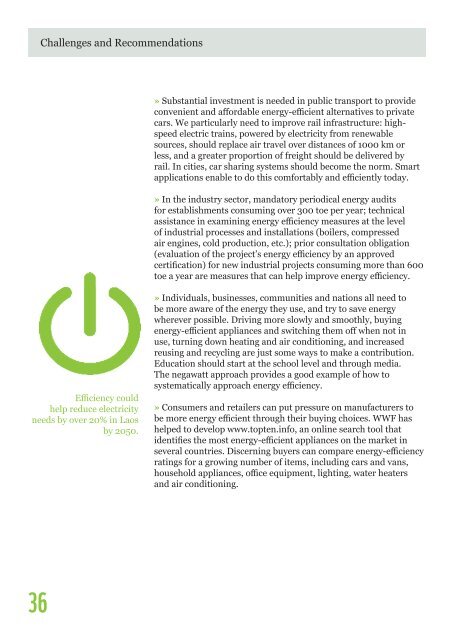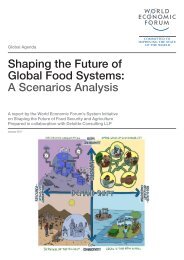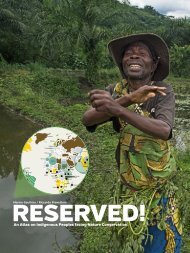Vision 2050
wwf_greater_mekong_power_sector_vision_2050
wwf_greater_mekong_power_sector_vision_2050
You also want an ePaper? Increase the reach of your titles
YUMPU automatically turns print PDFs into web optimized ePapers that Google loves.
Challenges and Recommendations<br />
» Substantial investment is needed in public transport to provide<br />
convenient and affordable energy-efficient alternatives to private<br />
cars. We particularly need to improve rail infrastructure: highspeed<br />
electric trains, powered by electricity from renewable<br />
sources, should replace air travel over distances of 1000 km or<br />
less, and a greater proportion of freight should be delivered by<br />
rail. In cities, car sharing systems should become the norm. Smart<br />
applications enable to do this comfortably and efficiently today.<br />
» In the industry sector, mandatory periodical energy audits<br />
for establishments consuming over 300 toe per year; technical<br />
assistance in examining energy efficiency measures at the level<br />
of industrial processes and installations (boilers, compressed<br />
air engines, cold production, etc.); prior consultation obligation<br />
(evaluation of the project’s energy efficiency by an approved<br />
certification) for new industrial projects consuming more than 600<br />
toe a year are measures that can help improve energy efficiency.<br />
Efficiency could<br />
help reduce electricity<br />
needs by over 20% in Laos<br />
by <strong>2050</strong>.<br />
» Individuals, businesses, communities and nations all need to<br />
be more aware of the energy they use, and try to save energy<br />
wherever possible. Driving more slowly and smoothly, buying<br />
energy-efficient appliances and switching them off when not in<br />
use, turning down heating and air conditioning, and increased<br />
reusing and recycling are just some ways to make a contribution.<br />
Education should start at the school level and through media.<br />
The negawatt approach provides a good example of how to<br />
systematically approach energy efficiency.<br />
» Consumers and retailers can put pressure on manufacturers to<br />
be more energy efficient through their buying choices. WWF has<br />
helped to develop www.topten.info, an online search tool that<br />
identifies the most energy-efficient appliances on the market in<br />
several countries. Discerning buyers can compare energy-efficiency<br />
ratings for a growing number of items, including cars and vans,<br />
household appliances, office equipment, lighting, water heaters<br />
and air conditioning.<br />
36




